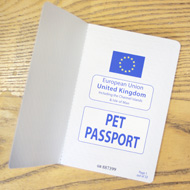Defra consults on pet travel rules

Since pet travel rules changed in January 2012, many veterinary and animal welfare organisations have voiced concerns about disease risk and illegal puppy imports.
Defra is running a consultation on pet travel legislation as part of a mandatory review.
Views are being sought on how effective the Non-Commercial Movement of Pet Animals Order 2011 (as amended) has been in facilitating the EU Pet Travel Scheme in Great Britain.
From 1 January 2012 the UK was required to align its import requirements with those of other EU member states under the EU pet travel regime. As a result there was no longer a requirement for a blood test for pets entering (or re-entering) the UK from member states and listed third countries. The waiting period after a rabies vaccination also reduced from six months 21 days.
The changes have prompted criticism from many veterinary and animal welfare organisations, over concerns about abuse of the scheme leading to illegal puppy imports and a growing risk of exotic diseases arriving in the UK.
Responding to the news, BSAVA said in a statement: 'We are aware that the changes to the Pet Travel Scheme, introduced in January 2012 and December 2014, have significantly increased the number of animals, particularly puppies, entering the UK including those for sale which should not be coming in under the Pet Travel Scheme.
"We also know that a significant number of veterinary practices have been presented with animals that do not fully comply with the requirements of the Pet Travel Scheme and that contacting the appropriate department in the local authority is not always easy."
The organisation is urging vets to take the opportunity to take part in the consultation, and to encourage any clients with experience of travelling in the EU to do the same.
Defra is looking for responses to help it determine whether the 2011 order has met its objectives, whether those objectives are still proportionate, and if they could be achieved in a less burdensome way.
The review does not relate to potential changes to the legislation following the UK's exit from the EU. However, Defra says Brexit clearly has implications for future pet travel policies. Until the UK's exit, the country remains a full member of the EU and the government will continue to implement the rules set out under the EU Pet Travel Scheme. Those responding to the consultation are therefore urged to focus comments on the 2011 order.
Defra plans to put its review report before parliament by 31 December 2016.
To take part in the consultation visit: https://consult.defra.gov.uk/exotic-disease-control/petorderreview
All responses must be submitted by 27 October 2016.



 The Animal and Plant Health Agency (APHA) has updated its online reporting service for dead wild birds.
The Animal and Plant Health Agency (APHA) has updated its online reporting service for dead wild birds.